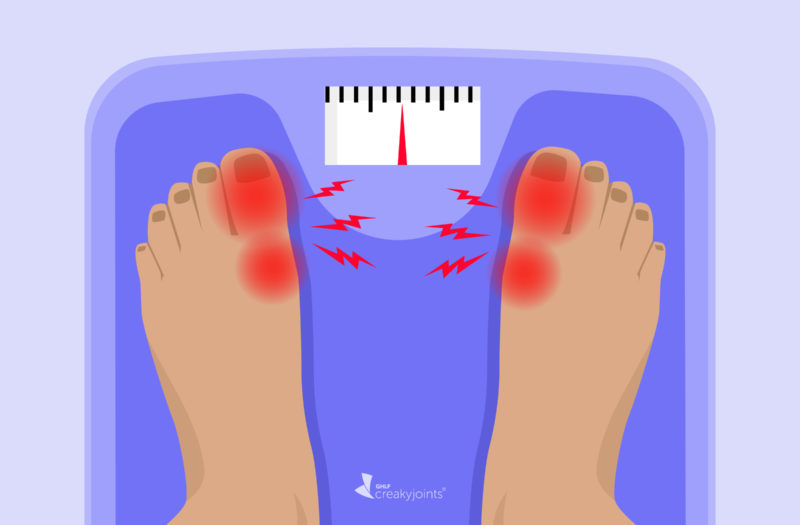Key Takeaways
- Gout risk in women increases after menopause.
- Obesity and genetic risk factors both increase gout risk, but there may be a synergistic effect: Women with obesity and genetic risk for gout were most likely to develop it.
- If you have gout in your family because of shared genes, it may be even more important to reach and stay at a healthy weight.
Gout is often thought of as a health condition that affects older men. While it’s true that men are more likely (about three times more) to develop this inflammatory disease, women can most certainly have gout, especially when uric acid levels rise after menopause-related hormone changes. (Gout occurs when uric acid, a normal waste product, crystalizes in the joints.) Other important risk factors for gout in women, according to new research: body mass index (BMI) and genetics.
A new study, published in the Annals of the Rheumatic Diseases, used data from the ongoing Nurses’ Health Study. The authors, based at Massachusetts General Hospital, analyzed information on more than 18,000 women to learn about the connection between BMI and genes and gout.
While there isn’t a single gene that causes gout, there are many genetic variations (single nucleotide polymorphisms, or SNPs) that are associated with an increased risk. In this study, the researchers generated a genetic risk score for each participant based on 114 SNPs that are known to impact levels of uric acid.
After adjusting for factors including age and menopausal status, the researchers found that gout risk for women increased along with BMI, with those in the highest BMI category (35 or greater) having the greatest risk.
Not surprisingly, women with the highest genetic risk scores were also significantly more likely to have developed gout. Those with a genetic predisposition as well as obesity faced the highest risk.
“While excess adiposity [body fat] and genetic predisposition both are strongly associated with a higher risk of gout, the excess risk of both combined was higher than the sum of each,” the authors concluded.
Although you don’t have to be obese or overweight to get gout, excess weight is a well-known risk factor among men. Weight gain might increases uric acid levels in the bloodstream.
Found This Study Interesting? Get Involved
If you are diagnosed with arthritis or another musculoskeletal condition, we encourage you to participate in future studies by joining CreakyJoints’ patient research registry, ArthritisPower. ArthritisPower is the first-ever patient-led, patient-centered research registry for joint, bone, and inflammatory skin conditions. Learn more and sign up here.
Gout. Cleveland Clinic. https://my.clevelandclinic.org/health/diseases/4755-gout.
McCormick N, et al. Impact of Adiposity on Risk of Female Gout Among Those Genetically Predisposed: Sex-Specific Prospective Cohort Study Findings Over >32 Years. Annals of the Rheumatic Diseases. December 2021. doi: http://dx.doi.org/10.1136/annrheumdis-2021-221635.
Walsh N. Genes and Extra Weight Tied to Higher Gout Risk in Women. MedPage Today. December 7, 2021. https://www.medpagetoday.com/rheumatology/generalrheumatology/96052.






